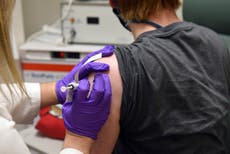Pfizer Covid vaccine to be rolled out next week after UK authorises jab
‘A major step forward in the fight against Covid-19’
Your support helps us to tell the story
From reproductive rights to climate change to Big Tech, The Independent is on the ground when the story is developing. Whether it's investigating the financials of Elon Musk's pro-Trump PAC or producing our latest documentary, 'The A Word', which shines a light on the American women fighting for reproductive rights, we know how important it is to parse out the facts from the messaging.
At such a critical moment in US history, we need reporters on the ground. Your donation allows us to keep sending journalists to speak to both sides of the story.
The Independent is trusted by Americans across the entire political spectrum. And unlike many other quality news outlets, we choose not to lock Americans out of our reporting and analysis with paywalls. We believe quality journalism should be available to everyone, paid for by those who can afford it.
Your support makes all the difference.The government has authorised the first coronavirus vaccine after the UK’s independent medicines agency approved the Pfizer-BioNTech jab in a landmark moment in the fight against Covid-19.
The health secretary Matt Hancock said the vaccine, which has shown in studies to be 95 per cent effective, will be made available from next week for priority groups with the NHS on standby.
The newly-appointed minister for overseeing the roll-out of a vaccine, Nadhim Zahawi, said it was a “major step forward in the fight against Covid-19” as the UK became the first western country to approve a jab.
In a statement, the Department of Health and Social care said the government had accepted the recommendation from the UK’s independent regulators, the Medicines and Healthcare products Regulatory Agency (MHRA), to approve the vaccine for use among the general population.
They added: “This follows months of rigorous clinical trials and a thorough analysis of the data by experts at the MHRA who have concluded that the vaccine has met its strict standards of safety, quality and effectiveness.
“The Joint Committee on Vaccinations and Immunisations (JCVI) will shortly publish its final advice for the priority groups to receive the vaccine, including care home residents, health and care staff, the elderly and the clinically extremely vulnerable.
“The vaccine will be made available across the UK from next week. The NHS has decades of experience in delivering large scale vaccination programmes and will begin putting their extensive preparations into action to provide care and support to all those eligible for vaccination.
“To aid the success of the vaccination programme it is vital everyone continues to play their part and abide by the necessary restrictions in their area so we can further suppress the virus and allow the NHS to do its work without being overwhelmed. Further details will be set out shortly.”
The government has, so far, ordered 40 million doses of the Pfizer/BioNTech vaccine, with 10 million due in the UK by the end of 2020. Patients need two doses, meaning not enough shots have been secured for the entire population.
Previous guidance published by the JCVI suggests residents and staff in elderly care homes will be first in line to receive jabs, followed by those who are over 80-years-old and health and social care workers. An updated list is expected to be published later today.
Speaking on Sky News, Mr Hancock said: “This is fantastic news. The MHRA, the fiercely independent regulator, has clinically authorised the vaccine for rollout. The NHS stands ready to make that happen.
“So, from early next week we will start the programme of vaccinating people against Covid-19 here in this country.”
On the challenge posed by the need for the vaccine to be stored at an ultra-low temperature of around -70C, he added: "This is a challenging rollout and the NHS in all parts of the UK stands ready to make that happen.
In a separate interview on BBC Radio 4’s Today programme, the health secretary said he expected 800,000 jabs to be available in the “first instance” and “many millions” available before the end of 2020.
He added: “The vast majority of vaccinations we expect to be in the new year and this is a vaccination that requires two doses – 21 days apart – and so of course it will take time to roll it out. The speed at which we go will be determined by how quickly Pfizer can manufacture in Belgium.”
However, as England’s national lockdown is replaced on Wednesday with the government’s new tiered approach, Mr Hancock warned: “We’ve got to hold our nerve, we’ve got to hold our resolve and that is on everyone because all of us can spread it."
Sir Simon Stevens, the chief executive of the NHS, said the vaccination programme would be the “largest-scale vaccination campaign in our country’s history”, adding: “This is an important next step in our response to the coronavirus pandemic and hospitals will shortly kick off the first phase of the largest-scale vaccination campaign in our country’s history”.
Ministers are also keenly awaiting the verdict of the MHRA on a second vaccine developed by Oxford University and AstraZeneca. The UK has placed orders for 100 million doses of the vaccine – enough to inoculate most of the population.





Join our commenting forum
Join thought-provoking conversations, follow other Independent readers and see their replies
Comments